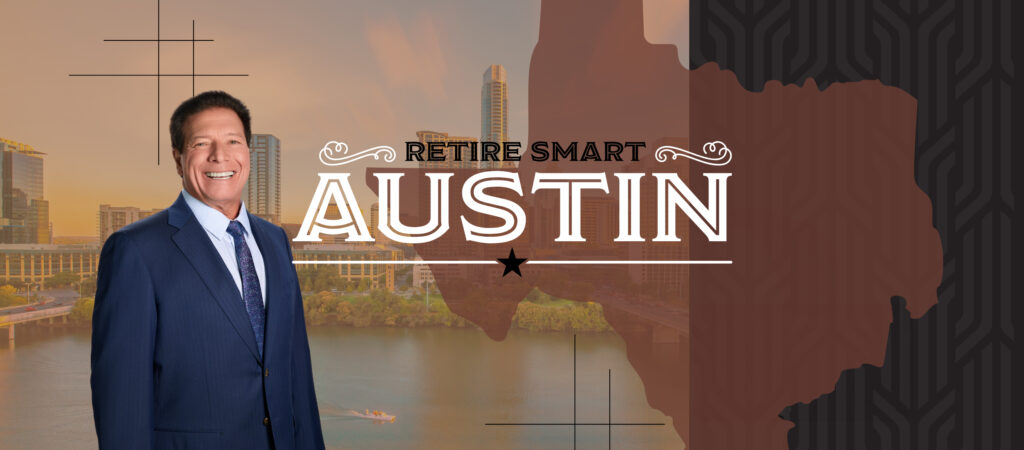Mike Spangle 00:28
Welcome once again to retire smart Austin with Phil Capriotti, senior He is the founder of Empower Wealth and tax. I’m your host, Mike Spangle. Phil, you are looking great, and we’ve got a lot of information. You’ve been getting tons of phone calls and questions about this. Geez, you we just did a show recently on estate planning got into some specific tools. We’re going to do a little bit of that again today. What I just wanted to do a quick overview for everybody who might be joining us for the first time in power, wealth and tax. It’s full-service firm, it is an independent firm, you are a fiduciary? Explain what that means for our audience.
Philip Capriotti 01:02
Yeah, let’s talk about that. Because I even have a number of folks who I play golf with over at Horseshoe Bay, and they’re like, cap, what do you do? Okay. They call me cap. And that’s what all my friends call me, especially when I was a kid growing up, you know, or-
Mike Spangle 01:16
Or at least those are the words that you can say that they call you on the air.
Philip Capriotti 01:20
Something like that. So, they’re like, What do you do? You know, and I told him, you know, well, I’ll tell you, you know, back in 2005, it started really, in the early 2000s, I worked for big box firm. I know what broker dealers are like, I understand the whole modus operandi there. But what I decided you have to understand my education is in taxes, accounting, and, and auditing. This is really where I cut my teeth. It was accounting and finance and economics, this is what I loved. So, we kind of got diverted a little bit into wealth management. And we’ve done wealth management, for years. For years, we’ve managed portfolios, and so forth. The fact of the matter is what I decided to do at the turn of the, you know, why k two was to start my own firm. Now, my wife right now, who was my fiancée, almost ever ending fi-, never ending fiancé. I told her in 2004, I said, Honey, I’m going to start my own firm. And she said, What? What do you mean, start your own firm. I said, No one understands the benefit of retirement planning. These individuals in these firms won’t let us touch packs planning and retirement planning. Because they’re broker dealers. They don’t hold a vigorous series 65 license now with that, and they’re maybe not necessarily registered investment advisors, they might be an employee of Johnny, Joey, Eddie, whoever, okay. So, they’re actually employees that work for a company. So, they offer products that that company basically tells them to sell, I get it. And there’s nothing wrong with that. I said, but what I see with the growing debt are folks are going to be as all of us are baby boomers, all of us, we’re going to need tax advice. Because we’re saving all of the we’ve been programmed to save this money in for one case, for the last 30 years. This is going to be a looming tax problem, because they keep spending, they can’t keep a balanced budget, the debt is growing. And the fact of the matter is, I told her, I said, I’m going to start a firm, we’re going to have a be a CPA firm. We’re going to be a wealth management firm; we’re going to offer all types of insurance products and other financial instruments. But most of all, we’re also going to do estate planning. We’re going to wrap all of the needs in one firm, and we’re going to have licensed specialists in every area.
Mike Spangle 03:56
Hence, Empower Wealth and Tax. That’s what Phil and his team do every single day in the offices is helping you with whatever your retirement planning needs are. Yes, there are investment firms out there. Yes, there are CPA firms out there. Yes, you can go to the Social Security office and ask them How do I turn this on or off? But how do you put all these pieces together you talk with someone like Phil Capriotti senior who is independent, whose firm is a fiduciary. So, let’s go let’s go a little bit into a client case study. You’ve got some so many 1000s of specific people who have come in, because I think it’s going to take us back down to the estate planning trail again, very specific since 2005.
Philip Capriotti 04:37
When I started this company, and by the way, folks, my wife was dead set against it. She said Don’t you dare leave that? Well, you’re gonna, you’re gonna start your own company. Let me understand this. You’re gonna leave that six-digit job and start your own company. I said Yes, honey, I am. Because I can see the future here. And not only that, we want to provide what we need to get back to the community and We’re going to build it. I said, You trust me, you fell in love with me. Or at least you told me that if you did, I fell in love with you why I trust that you, you fell in love with me why you trust me trust me on this, I feel like I’m moving into I’m being I’m being guided by some other force. So, let’s let me go ahead and do it. I’m not going to be the guy that says I wish I would have done this; I’d rather be that individual that just did it and either succeeded or not. But in either event, we have lots of case study. So as most of you know, we always stop start with social security planning for talking with a client that has not filed Social Security benefits, and I don’t want to go down that road. We’ve done it enough. What I want to talk about is one of our viewer calls, okay, okay, we’re gonna start with that love that we we’ve been doing that a lot. We’ve been getting a lot of calls. And since we can only take the first five callers, because now we’re on two different radio stations on the weekend, Saturday and Sunday. We’re on KLBJ, we’re also on The Bridge. They just added another TV network ABC on Saturdays from 1111 30. So, we can take five callers per episode for our complimentary consultations. So, one of the questions I got from a caller, and I got some of these, I’m going to tell you, baby boomers are intelligent people. They know exactly what they’re doing. You know why? They have experience. That’s why primarily, so I had this individual call me and ask the question, what is a GRAT?
Mike Spangle 06:33
A GRAT? I know I’ve seen this from o, I’m saying this from studies, but…
Philip Capriotti 06:39
a g r a t. And I was very impressed. And I realized that this was either someone trying to exercise our knowledge, which we embrace, we like to see that. And so today, we’re going to cover that topic. And it’s a topic that can affect everyone. We talked about the sunsetting of the estate taxes, that unlimited state tax, now it’s at 13.9- 13,900,000. That’s going away, it’s probably going to get reduced to somewhere between three and 5 million is what they’re talking about. What a grad is what that acronym stands for is a grantor retained annuity trust. Again, it’s a legal document. It’s a trust. It’s a grantor retained annuity trust. Now one of the nice things we talked about eyelets, irrevocable life insurance trust the pate estate taxes last week, what a grant is designed to do is designed to transfer appreciating assets with reduced estate tax consequences. So, when we have clients that are business owners, when we have clients that are landowners, they own they have wealth, they’ve amassed wealth, they’re looking, we’re all looking at ways to save and transfer wealth to our beneficiary, a bet to our beneficiary, but say taxes on it as well. So, what it does, okay, it’s basically an annuity, you know, everybody hates an annuity. I think as an asset class, you should not have just stocks, bonds, ETFs and mutual funds, you should have a myriad of multiple accounts depending on what your needs are. But at any rate, a grantor retained annuity trust is designed to estimate or freeze your assets. So, what I want to do is I want to freeze the value of the asset SATs assets for estate tax purposes. So, appreciation is not included in the estate tax calculation when I pass away. So, let’s assume that I have a grant, what does it do for you while you’re alive? Well, the grand tour, okay, or the owner of the grant gets to retain an income stream, an annuity income stream. So…
Mike Spangle 08:57
And that’s what I was wondering, because once we put it in an irrevocable trust, my understanding from life insurance was that we are no longer allowed to receive proceeds. Phil, I do want to hear more about it. We have a message from you and your firm. Don’t go anywhere. More on the ground. I got you. I got your film. We’re coming right back. Folks call the phone over. You see right here. As Phil said, we’re on so many different stations, both radio and television, we can only take the first five callers or the first five people who use the QR code down on the bottom of the screen. Open your phone, click on that down there, you open up to the camera function once it highlights on their first five people who sign up on the website or who called the phone number 888-818-6557. You call an estate planning attorney. Even if you make an appointment over the phone, we’re going to charge you for a retainer fee. Not here with Phil Capriotti senior. We will just have a discussion with you Come on into the office. More with Phil Capriotti senior right after this.
Philip Capriotti 09:53
I watched my parents work, work themselves really to the bone. I saw him My father, retire at 63 and pass away. Six months later, once he had stopped working, my mom looked at me and she said, You better be an accountant. You better learn the tax law. I went to a private school, got a great education, lived in the library and graduated without any debt; I realized the benefit of being debt free at a very young age. And I also realized the benefit of educating and speaking to people and I liked working with folks who actually needed help. I started my company 17 years ago. And now we employ two CPAs and two licensed tax professionals. We have a legal arm that helps folks design trusts as well as wills. We have an insurance and that offers property casualty insurance, we sell health insurance, Medicare Supplements, long term care, life insurance, annuities, and we have wealth management that I started to work with Ed slot looking at tax efficient ways to have retirees or soon to be retirees retired, tax free. If your accountant or CPA is not also your financial advisor, you really have a conflict of interest.
Mike Spangle 11:23
Welcome back to retire smart Austin with Phil Capriotti, senior He’s the founder of Empower Wealth and tax. I’m your host, Mike Spangle. We’re talking about grantor retained annuity trust, don’t go anywhere. This is about estate planning, keeping more of your own money. But here’s the thing with the trust. I didn’t think income was possible. I thought we’ve got to put all of our assets into there, you’re saying we can create an income stream and still somehow keep it out of the estate?
Philip Capriotti 11:48
How do you how do you think? How do you think folks like the Rockefeller as an all of these multi billionaires retain their wealth, they retain it by using the tax code to their advantage to maximize what they get to keep and what they get to transfer for future generations just this is just another tool, one of many different trusts. Most folks think of a trust as okay, I’m just going to protect my assets or, or it’s going to my wills going to dictate who gets my assets, what child gets this, that and the other. We’re talking about income, we’re talking about assets, and were many of these, many of these vehicles, we didn’t really need to use unless you had an estate of like 20,000,025 30 million and up. But now that the federal estate tax is sunsetting and is going to reverse somewhere between three to 5 million, we really don’t know. But the fact of the matter is, with acid appreciation, we have to start looking at these procedures. This is one of the reasons we have to stay current on a tax code. This is why your financial advisor must know the tax code inside outside upside downside. Because when these changes affect you, we have to make sure that again, you’re protected against any additional taxes paid. So, let’s talk.
Mike Spangle 13:06
So GRATs are retained annuity trust, you just said the annuity word. And we know that people have an emotional reaction to (indistinct)
Philip Capriotti 13:12
It’s a trust, the trust owns the annuity. What’s it designed to do? It’s designed to freeze the assets. And it’s designed to not- is designed to freeze the assets for estate tax purposes only and time at transfer. But what it does is it provides an income stream now the trust owns the annuity; I can take the income stream. And let’s assume I want income of we’ll just say $100,000 a year I’m just going to use that when I pan so the assets in this trust pay me an income automatically now because it’s an annuity, even if it’s not managed as well as we’d want it to it never runs out of money. It’ll pay your income up to age 120. So, if you’re not as long as- you’re not Methuselah, or someone like that, live to 2 or 3 hundred.
Mike Spangle 14:06
Methuselah reference, I was waiting for it.
Philip Capriotti 14:10
So, the point is to develop an income stream now, if I pass away, or when I pass away, that annuity stream now goes to my spouse,
Mike Spangle 14:20
Okay, well, oh, I was gonna say, Well, I was gonna ask does it go to the spouse or were you passing the straight at the end, you can do this as a spousal (indistinct)
Philip Capriotti 14:26
It goes right to the spouse, okay. And I’m just saying this is the way we set it up, when my spouse passes away, what do I do with the income, I want it to go to the next generation. So, for So, I want to provide a income stream and I also want to provide tax efficiency. So, it potentially will low lower your overall tax burden is very efficient for wealth transfer. Now understand I am talking about higher net wealth individuals, but these types of techniques can be used for folks with a million 2,000,004 5 million in the moderate what I would call the moderate tax rates retirement. Yeah, I call that a moderate retirement plan. What I like to is the potential for growth. So, these, this grant or grantor retained annuity trust, they’re allowed to grow. So, for the most part, many of these plans will grow by an average of somewhere between seven and 8%, depending on how they’re managed, okay, so what we want to do is, we may be taking three, four or 5%, and annuity payments, so it’s continuing to grow. But because the trust owns it, it’s excluded out of our federal estate tax, I’m still going to have to pay federal income tax, but not- it will not blow up my federal estate tax.
Mike Spangle 15:47
And let me- you don’t directly benefit for putting together a trust for someone you’re talking about this for their own wealth preservation, you’re simply today talking about the tool, you’re not saying you want people to call in. Because you want to put together all of these trusts, you’re literally just talking about the tool today as an educational platform.
Philip Capriotti 16:04
We want to give them the knowledge because most folks and then every now and again, we’ll come up with an extremely intelligent, and many of our callers are very intelligent. And they’ll throw questions at us that normal folks, the regular everyday person that’s playing golf or tennis, they don’t think of so they’ll ask about it. And I want you folks to understand there isn’t a topic that we cannot explain to you. There isn’t a topic that we don’t know about one of the benefits of working with a licensed fiduciary. And someone like myself, and my firm is our wealth of knowledge and our experience. You know, I have I trained financial advisors across the country and have been doing so for over 15 years now. And I don’t believe in training my competition, I do like to train new financial advisors, I really enjoyed doing that. It’s all about teaching. Well, it’s also about training clients also about teaching your situation. And this is why every retirement income plan is so very, very different. Some folks, you don’t need a grant that’s unnecessary, but you may need something different or something similar. You may need an eyelet, you may need a grant, you may need one of the other trusts that are also available. But understand with this debt rapidly approaching $40 trillion. This country is not going to go bankrupt. We have plenty of money and plenty of assets for folks who have worked and built this country. And taxation is a way to redistribute the wealth. And we’ve been seeing it now, we’ve been seeing it now for over a decade. Now that we’re retired or for many folks are retired, we actually have a chance to see it and breathe it and smell it and then we of course we have to listen to the news as well. But the fact that matter is protect you and your family against the preserve your wealth, preserve your estate by asking questions, ask us questions, call the 800 number come in for a complimentary consultation. We love meeting new people. And I guarantee you this, once you come in and talk to talk to me and talk to my staff, you’ll realize when you make the comparison between advisor A B and C, being a complete advisor in power, wealth and tax, you’re going to want to come with us why? Because we have your back, and we keep you current on new tax changes each and every year as they occur.
Mike Spangle 18:36
Phil, in fact you put together a very specific message that we’re going to play right here folks, you can call the phone number, get started on your own complimentary entire review that will include your investments, taxes, social security, health care choices, and of course, estate planning. This is part of the conversation we’ve been having today. Call 888-818-6557. The first five callers who have reached out today we’ll be able to get an appointment, no cost to you whatsoever to do the review or you can use the QR code, open up your camera. Click on that when you highlight it on that black and white box down to the bottom. It’ll take you over the website, you can schedule your own appointment. Don’t go anywhere. Please watch this message from Phil Capriotti.
Philip Capriotti 19:19
Most of the folks that we work with are not going to outlive their money. When an individual comes into our firm. The very first question they ask how do I know you’re going to be here five years from now, your financial advisor and your licensed fiduciary this should be a lifelong commitment. It shouldn’t be a revolving door exercise generational planning. We have an opportunity to not only work together with retirees, but having my children work with their children, my grandchildren working with their grandchildren. So, we’re establishing a relationship that It will literally go through several generations. I have three children that are actively in the business. My youngest son Parker, who’s 22, is a junior trainer. He works in our home office in Phoenix with foundations. He’s in a three-year mentoring program. My son Philip is also a licensed fiduciary, he’s 41 years old, he will take over the business. And my daughter, Lisa, my oldest daughter, who’s 42 also has her securities and fiduciary license as well, this company will pass to my children, and hopefully someday to my grandchildren, but in the interim, teaching them through my example. That’s our firm.
Mike Spangle 20:49
Welcome back here with Phil Capriotti, senior, he’s the founder of Empower Wealth and tax. And as we just saw, from your message there, your firm is generational as well. But what we were talking about is generational wealth, but it’s putting it all together.
Philip Capriotti 21:00
And it’s kind of fun. You know, I gotta tell you, the producers are really sharp here, because my very next topic is wealth transfer to our beneficiaries. We were talking about grants and the benefits, the advantages, and some disadvantages of them, you are giving up control of the bulk asset to the trust. But again, you own the trust, what you really want to do is save yourself from excess taxation, or lawsuits and things of that nature. So, wealth transfer, in a GRAT, if this is something that should go in or could be part of your estate plan. It efficiently transfers wealth to your beneficiaries with very limited tax consequences. Again, it’s not necessarily how much I make, it’s how much I get to keep we pay taxes. I’ve said it over and over again, 3040 50 years, what is it then the next thing that we want to look at is potential for growth. So, with these the assets appreciate beyond the IRS as hurdle rate. Okay. So, when we look at that, that access, I want to pass to my beneficiaries without it being taxed or have it circumvented from the estate tax. So, this is one of the, again, one of the many tools that we use.
Mike Spangle 22:22
I got a quick question for you shoot for one of our viewers calls into our producer over here, hurdle rates. I’m sorry, I just want to get jargon I want to make sure we’re clear on and when he was saying, Grant, if you missed the first part of the we’re talking about grantor retained annuity trust, that allows growth and income, but does not become part of your own estate. What is the hurdle rate?
Philip Capriotti 22:41
Let’s assume that the new federal tax rate is 5 million, I’m just going to use that as an arbitrary number. Okay, that’s the hurdle we have to get over. Okay. Okay. So, anything under 5 million will not have any federal estate tax consequence. But once we exceed whatever that number is, it helps exclude that why? Because I no longer own it in my estate, I set it in this trust.
Mike Spangle 23:06
And that includes investments and property. And the reason we’re talking about it so much over the last couple of weeks and under radio programs is because it is very possible, obviously here in Texas to have very large land ownings.
Philip Capriotti 23:18
Exactly, many of my clients, are you kidding, even my mother in law, father in law, God rest their soul. What did they do, they work their fingers to the bone, they paid that they worked full time jobs, and were Ranchers on the side, they would buy land at $200 an acre, okay. And they and this is what they did. They were very, very savvy, they were very intelligent, I give them the utmost respect. Now, of course, my mother-in-law was a PhD in chemistry. And so, she pretty sharp, just as my wife is, but the fact of the matter is, they say they were- they went through the Depression. They knew what it was like to be without food. They knew what it was like to live under a tent when their house burned down and had no insurance. Don’t let me get started on that. But the fact of the matter is, they learned the value of $1. And they learned the value of keeping it in the family. So, when we take a look at it, the whole idea is to provide income. And again, we don’t want to exceed this. We want to protect against excess estate taxes. But the flexibility and this is what I want to talk with you about the growth in this annuity, that the investments that are inside of it are also excluded, and it can add the excess is passed to our beneficiaries, children, grandchildren or whoever your beneficiaries are our flexible annuity premiums. I’ve set a couple of these up where clients have said Phil, can I get an increase in my income of 5% a year, 3% a year, 4% a year? Or is the annuity like my wife’s teacher’s pension? It started at 30,010 years ago and is still paying 30,000. And the answer to that, folks, is absolutely. It’s extremely important when we put these plans in motion since Penn put together a trust any type of trust, if it’s an Income Trust, where we’re looking at annuity payments, we want to be able to provide increasing income to hedge against inflation. So, it doesn’t reduce or mitigate your purchasing power. It’s extremely important to keep pace with inflation. So, for instance, healthcare, inflation, 5% a year. Education inflation 5% here set. So, I want to provide income if I have the resources, and I have the assets again, I want to protect it. Now. Wealth Management is one thing, but protecting- I mean what good is it- It’s what you get to keep it’s not what you make.
Mike Spangle 25:54
Well, yeah. And we could I think where you were going was, we can chase after the returns, you can get some of the greatest theoretical returns out there. But if you’re not keeping it afterwards, where you’re not doing it properly, you’re not doing the complete planning.
Philip Capriotti 26:08
You know, depending on an individual’s risk tolerance, we’ll set up a plan I like to always minimize, or drawdown or market volatility want because I don’t want the market taking 2030 40% Like we saw happen to many retirees in 2008. So, I want to get the best return I can within a certain risk tolerance. Phil, if the market drops 40% tomorrow or next year, I don’t want my retirement accounts to lose 40%. How much will you be willing to lose? Five? Okay, we can get you this return for 5-10. How about 10? How about 15. So, we want to limit the drawdown. But getting back to these graphs, these annuity payments can literally go on for three generations, they can literally go be passed on to multiple generations, not just to me, not just to my spouse and to the kids, we can look at many, we can look at many other generations.
Mike Spangle 27:02
This is what I was curious about, because that’s one of the things even about doing proper planning with doing a Roth conversion. Oftentimes, even leaving those to the heirs, you have to get rid of all of those funds within a 10-year period. But in something like a trust, we’re talking about generational growth, yeah.
Philip Capriotti 27:18
And that’s the other thing. They’re custom designed for any term. So, we may want a short term grad, we may want a mid to long term grant, depending on your need and what you want to accomplish for your family is the way we’ll help design it. Remember, balancing a state distributions are extremely important. And when they say balancing distributions, how much do you want to give to the government? How much do you want to give to your family?
Mike Spangle 27:43
Thank you so much, Phil. call the phone number. You see right here the first five callers we can do your own complimentary review. Thank you for watching. We’ll be back next week.





